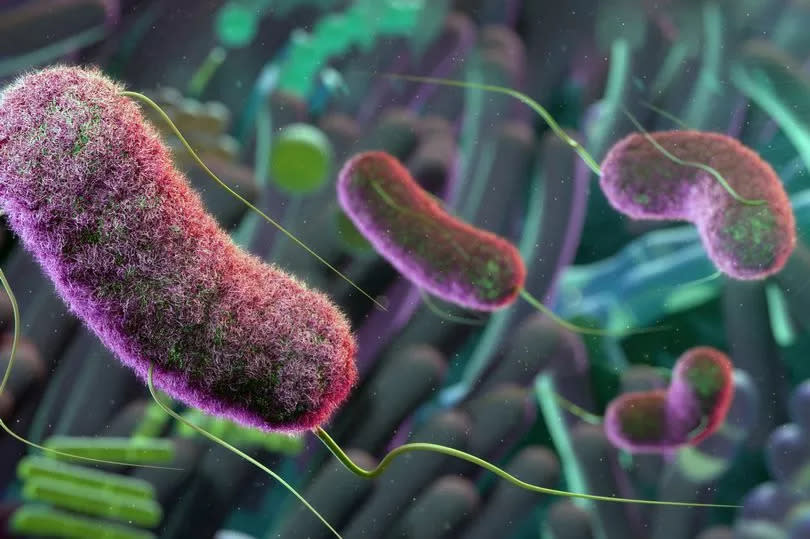Obesity and food addiction may be caused by certain gut bacteria, says new study

A new study suggests that compulsive eating and obesity could be sparked by a specific gut bacteria, potentially paving the way for novel treatments for food addiction and other eating disorders.
When it comes to losing weight and healthy eating, the belief is that both can be achieved by exerting strong willpower. However, new research suggests that this may not be the case - and it may be all down to our digestive systems.
Scientists have made a breakthrough in identifying particular bacteria in the gut that are linked to both humans and mice developing an addiction to food, which can result in obesity. Researchers also discovered bacteria that play a beneficial role in preventing food addiction.
Professor Elena Martin-Garcia, from Pompeu Fabra University in Spain, said: "A number of factors contribute to food addiction, which is characterised by loss of control over food intake and is associated with obesity, other eating disorders and alterations in the composition of bacteria in the gut the gut microbiome.
"Until now, the mechanisms underlying this behavioural disorder were largely unknown."
The findings will be presented at the Federation of European Neuroscience Societies (FENS) Forum in Vienna, Austria, on Thursday (June 27th) and simultaneously published in the journal Gut.

Professor Rafael Maldonado, head of the Laboratory of Neuropharmacology at Pompeu Fabra University, shared: "These results from our study may allow us to identify new biomarkers for food addiction and, most importantly, to evaluate whether the beneficial bacteria could be used as potential new treatments for this obesity-related behaviour, which, at present, lacks any effective therapeutic approaches.
"Potential new treatments could involve using beneficial bacteria and dietary supplementation."
Professor Martin-Garcia utilised the Yale Food Addiction Scale (YFAS 2.0) to diagnose food addiction in both mice and humans. The scale includes a series of 35 questions that are designed to elicit three criteria in mice: persistent food-seeking, high motivation to obtain food, and compulsive behaviour.
She and her team analysed gut bacteria in mice with and without food addiction, discovering an increase in Proteobacteria phylum and a decrease in Actinobacteria phylum within the food-addicted mice. A decrease was also observed in a bacterial strain known as Blautia from the Bacillota phylum.
Making use of the YFAS, the researchers categorised 88 patients based on food addiction, evidencing similar findings to those in mice, such as decreases in Actinobacteria phylum and Blautia, along with increases in Proteobacteria phylum among those addicted to food.

With both mice and humans displaying similar patterns, Prof. Martin-Garcia explained: "The findings in both mice and humans suggested that specific microbiota could be protective in preventing food addiction."
"In particular, the strong similarities in the amount of Blautia underlined the potential beneficial effects of this particular gut bacteria."
"Therefore, we investigated the protective effects of oral administration of lactulose and rhamnose, which are non-digestible carbohydrates known as 'prebiotics' that can increase the amount of Blautia in the gut."
"We did this in mice and found that it led to an increase in the abundance of Blautia in mice faeces in parallel with dramatic improvements in food addiction. We saw similar improvements when we gave the mice a species of Blautia called Blautia wexlerae orally as a probiotic.
"The gut microbiota signatures in both mice and humans suggest possible non-beneficial effects of bacteria belonging to the Proteobacteria phylum and potential protective effects of increasing the abundance of Actinobacterial and Bacillota against the development of food addiction."
Prof. Martin-Garcia believes their study underscores the powerful influence gut bacteria can have on brain function. She stated: "We have demonstrated for the first time a direct interaction between the gut composition and brain gene expression, revealing the complex and multifactorial origin of this important behavioural disorder related to obesity.
"Understanding the crosstalk between alterations in behaviour and bacteria in the gut constitutes a step forward for future treatments for food addiction and related eating disorders."
Prof. Martin-Garcia also discussed research into how microRNAs (miRNAs) tiny, single-stranded molecules that regulate gene expression and contribute to nearly any cellular process play a role in food addiction. She suggests that changes in the expression of miRNAs could be involved in the mechanisms underlying the disorder.
The team used a method known as Tough Decoy (TuD) to inhibit specific miRNAs in the medial prefrontal cortex (mPFC) of mice brains, creating mice that were susceptible to developing food addiction. They clarified that the mPFC is the part of the brain responsible for self-control and decision-making.
They discovered that inhibiting miRNA-29c-3p encouraged persistence of response and increased the susceptibility of the mice to develop food addiction. Inhibiting another miRNA named miRNA-665-3p promoted compulsive behaviour and vulnerability to food addiction.
Prof. Maldonado commented: "These two miRNAs could act as protective factors against food addiction. This helps us to understand the neurobiology of the loss of eating control, which plays a crucial role in obesity and related disorders."
"To understand these mechanisms further, we are now exploring how the gut microbiota and miRNA expression in the brain interact in mice."
Chair of the FENS communication committee Professor Richard Roche welcomed the findings.
Prof Roche, of Maynooth University, Ireland, who was not involved in the research, said: "Compulsive eating and food addiction is a growing problem worldwide. There are many factors that contribute to it, in particular the environment that people live in and the availability of certain types of food.
"However, we've known for some time that there are probably contributing factors for eating disorders and the research by Professor Martin-Garcia and colleagues shows how the different types of bacteria in the gut have an impact on brain function and vice versa in humans and mice."
He added: "This understanding opens the way to developing potential new treatments for eating disorders, and we look forward to seeing more research in this area."
Join the Daily Record's WhatsApp community here and get the latest news sent straight to your messages

 Yahoo News
Yahoo News 
